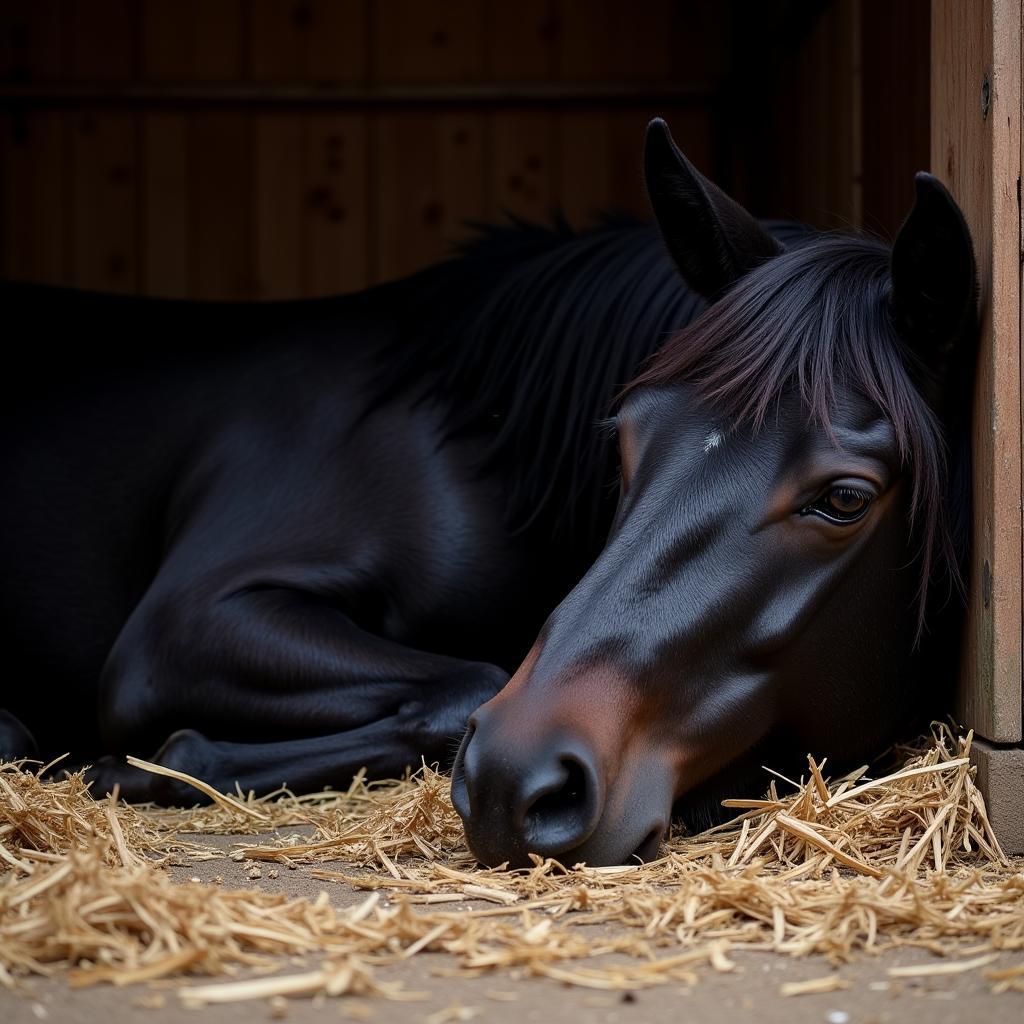Seeing your horse lying down in their stall or pasture might seem unusual, maybe even alarming. After all, we associate horses with standing tall and proud. But the truth is, whether or not it’s normal for a horse to lay down depends on a few factors. Let’s delve into the world of equine sleeping habits and put your mind at ease.
Understanding Horse Sleep Cycles
Horses, unlike humans, don’t sleep for long stretches. They’re polyphasic sleepers, meaning they take multiple short naps throughout the day and night. These naps can range from a few minutes to a couple of hours.
While horses can sleep standing up, thanks to a unique stay apparatus in their legs, they need to lie down to achieve deep sleep, also known as REM sleep. During REM sleep, muscles completely relax, allowing for essential physical and mental restoration.
 Horse Laying Down in Pasture
Horse Laying Down in Pasture
So, How Often Should a Horse Lay Down?
A healthy horse will typically lie down for 1 to 3 hours within a 24-hour period. However, this can vary based on age, temperament, and environment.
Here’s a breakdown:
- Foals and young horses: You’ll often find them snoozing on the ground as they require more rest.
- Older horses: They might lay down more frequently due to joint stiffness or discomfort.
- Individual personality: Just like people, some horses are simply more inclined to take naps!
When Laying Down is Cause for Concern
While it’s normal for horses to lay down, excessive rolling, groaning, or an unwillingness to get up could signal a problem. This could indicate anything from colic (abdominal pain) to injuries.
Here are some red flags to watch out for:
- Sudden changes in behavior: A horse that normally lays down rarely and suddenly starts spending excessive time down might be unwell.
- Signs of pain: Pawing, sweating, flank watching, and rolling more aggressively than usual can indicate pain.
- Difficulty getting up: If your horse struggles to rise after lying down, there may be an underlying injury or illness.
 Horse Stretching After Laying Down
Horse Stretching After Laying Down
If you notice any of these signs, it’s crucial to contact your veterinarian immediately. Early intervention is key in addressing potential health concerns.
Creating a Comfortable Resting Place
You can encourage healthy sleeping habits in your horse by providing a safe and comfortable resting area:
- Adequate bedding: Ensure your horse’s stall has ample clean, dry bedding like straw or shavings for cushioning.
- Spacious environment: Horses need enough space to comfortably lie down and get back up. A stall that’s too small can restrict movement.
- Safe footing: Avoid slippery surfaces in the stall and ensure the pasture is free from holes or obstacles that could cause injury.
For more information on caring for your horse’s musculoskeletal system, check out our guide on horse leg muscles.
Expert Insights
“It’s a common misconception that horses sleep standing up all the time,” says Dr. Emily Carter, a renowned equine veterinarian. “While they have that remarkable ability, deep, restful sleep happens when they’re lying down. As owners, it’s our responsibility to observe their sleeping patterns and ensure they have a safe and comfortable space to rest.”
 Horse Sleeping Peacefully in Stall
Horse Sleeping Peacefully in Stall
Conclusion
So, Is It Normal For A Horse To Lay Down? Absolutely! It’s a natural and essential part of their sleep cycle. However, it’s vital to be aware of your horse’s individual habits and any changes in behavior. By paying attention to their sleep patterns and providing a comfortable resting place, you can contribute to their overall well-being. If you ever have any doubts or concerns, don’t hesitate to reach out to your veterinarian for guidance.
Remember, a well-rested horse is a happy and healthy horse!
FAQs
1. Why does my horse sleep standing up?
Horses have a unique anatomical feature called the stay apparatus that allows them to lock their legs and doze while standing. This helps conserve energy and allows for quick escapes from predators in the wild.
2. How can I tell if my horse is sleeping deeply while lying down?
Look for signs like relaxed muscles, drooping eyelids, occasional twitching, and even soft snoring sounds.
3. Should I be worried if my horse never lays down?
While it’s rare, some horses might avoid lying down due to stress or discomfort. If you notice this, consult your veterinarian to rule out any underlying issues.
4. Can I wake my horse up if it’s sleeping soundly?
It’s best to avoid suddenly waking a sleeping horse. They can startle easily, which could lead to accidental injuries.
5. My horse has started rolling excessively. What should I do?
Excessive rolling can be a sign of colic, a serious abdominal condition. Contact your veterinarian immediately if you notice this behavior.
We’re Here to Help!
Have more questions about your horse’s health and well-being? Need advice on equine care? Contact Justus Horses USA at 0772127271, email us at [email protected], or visit us at QGM2+WX2, Vị Trung, Vị Thuỷ, Hậu Giang, Việt Nam. Our team of experts is available 24/7 to provide support and guidance. You can also find a wealth of information on our website, including resources on horse arthritis supplements and the best horse calming supplement.